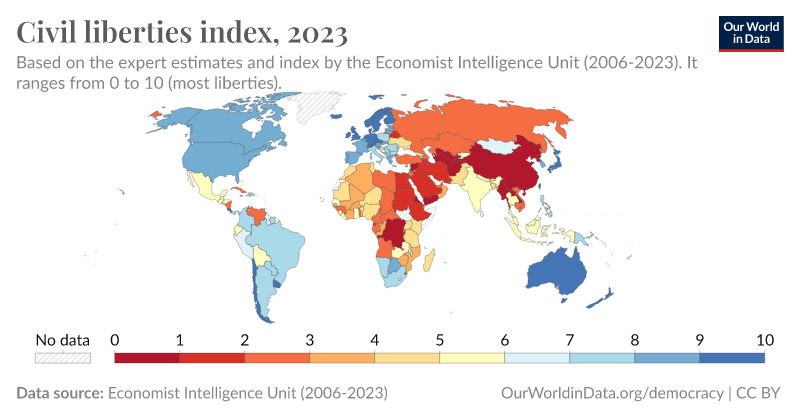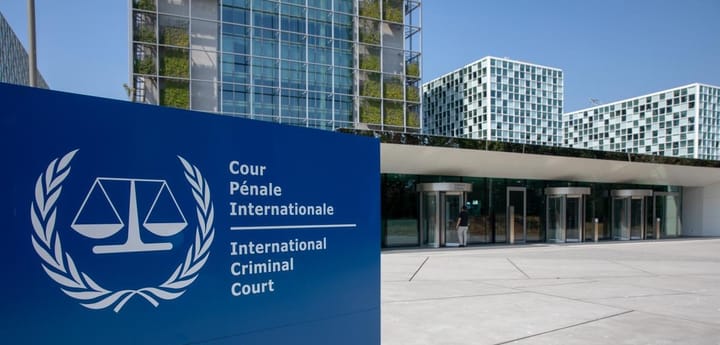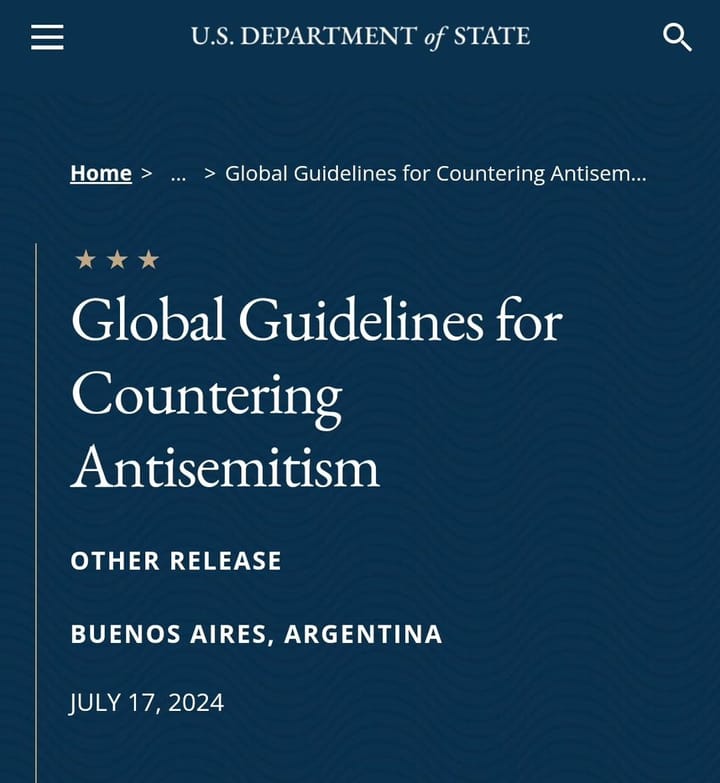The Dangers of Authoritarian States & Failed-State Democracies to The Global Order: Why the ICC Warrant for Israeli Leaders Threaten the World With Chaos

“Good people don't need laws to tell them to act responsibly, and bad people will find a way around the laws.”
- Plato
Democracy, the rule of law, and civil liberties were not granted to humanity from creation.
The Creator left the human race to evolve to the realization and form consensuses that allow human beings to thrive in a safe world where people can live more fruitful lives.
This did not come easily from the very first day. It took many wars for humanity to realize this fundamental truth—that in the absence of treaties to build legitimate states where the people are free, nations will rise against nations, and families will rise against families.
The United Nations as we have it today is a product of the American people's admission that the legitimate form of governance is one where the life, liberty, and property rights of individual citizens are recognized in a state that ensures the rule of law and a common defense.
A common defense in this context relates to objectively rather than subjectively handling existential threats. Liberal democracy functions not on the basis of dogma but as a consensus-building political machinery that regenerates itself within a covenantal framework.
Before the founding of the United States, the Treaty of Westphalia was signed in 1648 by the states of Europe to respect each other's differences unconditionally. This laid the impetus for unprecedented development that put Europe ahead of other regions of the world – China, the Middle East, and India. However, the Treaty of Westphalia did not create functional and efficient states by itself. It was the United States' model of governance that extracted excellence from the Westphalian system. Historically, no civilization has generated more human productivity and advancement than the American governance model. It would be a mistake of the human race to regress to a laissez-faire Westphalian type of international model without the fundamental pillars that make it useful and efficient.
The United States internalized these core values of equality, liberty, free markets, choice, and legitimate governance to build on the Westphalian model. Wilson Woodrow's attempt to export these ideas to the rest of the world after the First World War failed.
Only after Britain and France realized the objective truth the hard way after 1945 did they acquiesce to accepting the core values of American civil liberties and the rule of law. All other power brokering methods are problematic and self-destructive.
The United Nations as a Fragile Responsive Mechanism to Fix a Broken World
After failing to convince the world to accept democracy, the rule of law, free choice, and civil liberties, the United States knew that pushing too hard for an idealistic world would fail. Thus, the United Nations was formed on the basis of inclusion and aspirational values.
This saw an international order that included the Soviet Union, with its gruesome human rights records, and many other countries that were far from the core ideals of sustainable governance. Apparently, these states, irrespective of their cruelties and extreme abuses, also wanted to survive through the United Nations mutual recognition system. Thus, the Westphalian nonjudgmental model was applied successfully
and efficiently.
The maturity and wisdom of the generation that formed the United Nations required separating countries that were not ready to embrace democracy, human rights, and the rule of law in their truest forms. Thus, the Iron Curtain was notionally erected to separate the free world from the authoritarian world.
This allowed the most troubled regions to develop.
Meanwhile, the United Nations went on to underwrite the independence of many colonized lands throughout the Global South. Many of these nations were far from building modern states. Some were either too small or unprepared to have comprehensive modern governance. There are accounts of vast regions of colonized lands with millions of people who had a handful of people who could read or write. All these troubled lands were granted a mandatory independence arranged by the United Nations.
Today, most of those formerly colonized lands are still far from proper governance. Many nations are failed states that depend on aid and cannot build a state that can legitimately meet the people's needs.
However, the one-state-one-vote model grants all these states—including states that are so failed that only one person in a million can read, write, or think independently—the same vote in the General Assembly as a state with a million PhD holders.
There are degrees of authoritarianism that rule states around the globe. The Soviet Union was ruled by lies and propaganda, and many replicate that model. Kleptocracies, mobocracies, and mafia states also emerged in the late 20th Century.
Under the United Nations' aspirational model, all these states were welcomed and had the same rights as the most refined states. This helped the world develop faster than ever imagined. Without this aspirational path led by the United Nations, most regions of the world would not even know the basics of governance, and they would be unreachable by more refined ideas, technologies, and products.
The Collapse of the Soviet Union Did Not Automatically Change Authoritarian States Nor Strengthen Democracy in Failed/Fragile States
Our generation's mistake is to assume that after the collapse of the Soviet Union, the entire world was prepared for democracy and legitimate governance in its full sense.
That is a huge mistake of our generation!
Samuel Huntington’s Third Wave of Democracy asserted that during the first 40 years of the United Nations' international legal system, authoritarianism was dying down, and democratic structures were gradually taking over.[1].
Indeed, the United States and Western Europe jumped at this point and encouraged multiparty democracy and internationally-driven human rights regulations in most parts of the Global South after 1991. In Sub-Saharan Africa alone, 42 nations adopted multiparty democracy between 1990 and 2000[2].
One thing that runs through is that multiparty democracy and the foundations of the rule of law in most parts of the developing world were foreign introductions. Thus, they were not rooted in the foundations of these states.
Somalia held an election in 1986 – they touted it as a democracy. However, by 1991, the country was ruled through clannism. Each individual was loyal to their clan. And when an arms race began among the clans, the country lost its central authority.
Yet, under the aspirational international legal tradition, anyone who showed up in New York during this troubled period could attain the status of Somalia's "recognized government." Many such failed and fragile states parade within the "family of nations" with a purely elitist foundation injected from the international community—not by the will of the people.
A failed state will automatically become autocratic—even if it has all the required elements of democracy. The government is not legitimate if it does not use its powers legitimately, respect the people's rights, and create an enabling environment for citizens to pursue their goals.
Authoritarianism means the media and the people's minds are controlled. While this is the default position of the media, a failed state has citizens who lack the ability to clarify and confirm information independently.
Thus, you could have a failed state that professes to be democratic but thrives under the notion of a common enemy. As long as a state has failed its people and kept them ignorant, they will find the notion of creating a common enemy useful as that helps them mobilize support and enable the authorities to stay in power. A case in point is Sudan, which was kept together under Omar Al-Bashir by the hate for Israel, which had no connection and never posed a single threat to Sudan in his 30-year rule.[3]. Yet, all the issues Sudan’s people are killing each other for were conveniently hidden in plain sight under Al Bashir’s rule. That is because he weaponized vital institutions against his enemies and invoked Israel as the biggest threat to the Sudanese people. The BBC once called him the "master manipulator" who held power by accusing others of maintaining his legitimacy as head of government.[4].
Threats of Authoritarianism & the International Legal Order’s Stability
An identifiable trend is evolving in the international political system.
This involves weaponizing international institutions against established democracies and essential actions to ensure security within customary international law.
Since Hamas attacked Israel on October 7, 2023, there have been shifting narratives and selective plastering of elements of international law to rationalize the terror group’s actions against Israeli civilians.
Victimhood is being touted as a blank check for people who blatantly refuse to follow accepted protocols.
Breach of rules is now used as a sword rather than a shield to legitimize wrongful conduct in the name of victimhood.
While these trends were confined to national politics, a trend of invoking colonialism and other related ideals has been used to spread the sacred cloak of victim acquittal across international boundaries.
One avenue where these bent rules are applied most significantly is the International Criminal Court. This multilateral convention-based court system indicts persons responsible for mass crimes and severe human suffering.
First, there was the indictment of a sitting head of state of a UN Security Council permanent member.
Recently, it was used to indict a head of state of the only non-Muslim majority state in the Middle East.
These two incidents indicate that the ICC and many other international institutions can and have been used opportunistically. It has been weaponized and applied against specific states.
Seriously, a major international court system can undertake selective justice and overlook the killing of over a million people in the Middle East with no efforts to indict the persons involved in these wars. Yet, the selective justice pattern of the ICC was invoked against Israel, which was defending itself against terrorists.
The international order is at risk of being overrun by authoritarian and failed states that hardly represent a people and rule through acts that are far worse than those they accuse. Israel has been accused by the United Nations and international agencies more than any other state on the planet. However, Israeli democracy is more robust and significantly more productive than most of these states, which are never mentioned in these resolutions that condemn Israel.
Hence, it is conclusive that at this rate, the original intention of forming the United Nations to promote the rule of law, democracy, and civil liberties for citizens is at risk from authoritarian and failed states that seek to hijack the international legal and political system. This will not only be self-defeating, it will be a disincentive to effort and good faith actions that will reverse all the gains of the post-1945 global order.
Solution: Pursuit of Objective Truths
All international players must understand and accept self-evident truths about democracy, the rule of law, and civil liberties as the ultimate end of a sustainable international order - and work towards these virtues.
In the recent ICC decision and many other decisions that selectively target persons or states not covered by the new international political dynamics, the following pointers must be recognized, entrenched, and applied universally:
1. The centrality of the nation-state in pursuing security,
2. The need to universally condemn and discourage terrorism,
3. The need to respect and protect state sovereignty,
4. The need to encourage regional security and
5. The importance of democracy and the rule of law.
These vital truths must not be overlooked in the international political system. The nation-state is the main source of security for the largest number of people. Thus, states should not be discouraged from going after terrorists and armed groups. The notion of hostis humanis generis should be invoked universally to declare terror groups enemies of humanity everywhere.
A state cannot be held to the same level of accountability as a terrorist organization. While the international legal order can tolerate terrorism to a degree in the self-determination process, it should not be allowed to thrive as a means to an end. Hamas' actions on and after October 7, 2023, indicate that they have no plans to do what states do for the people of Gaza. And clearly, they have no intention to live at peace with Israel. As such, there should be no doubt about universally listing Hamas as a terror organization.
Regional security will remain the duty of the UN Security Council's permanent members. While Russia has been antagonized in its actions in Ukraine, the principle of allowing the superpowers to control regions and use power and decisive force will remain necessary and essential.
Thus far, the most significant action to deter war and violence in the Middle East (particularly the Levant) happened after September 2024, when Israel launched an aerial offensive into Lebanon and parts of Syria and directly confronted the Iranians and Houthis in Yemen through long-distance strikes. That is the essence of regional deterrence.
While Israel is not a UN Security Council permanent member, the use of superior weaponry and expertise allowed them to create the most peaceful two-month period in conflicts in the Middle East. As long as Israel was silent, there were groups like Hezbollah and others that were continuously engaged in armed conflict in the region. Such objective and clear regional actions were missing. However, once it happened, Iran felt its vulnerability, and they made peace with Saudi Arabia for the first time after the two regional powers accused each other for over a decade in what was known as the "Islamic Cold War".
Finally, power brokerage is best done through democracy and the rule of law. The temporary peace attained after Tehran and Riyadh established a rapprochement will not last forever. Only democracy and the rule of law can guarantee peace, security, and prosperity in the Middle East and the regions of the world that need these three elements badly. Thus, the international community must pursue that.
The best way of achieving this end is to create an antechamber in the international legal system that will lay out self-evident ideas and pointers and present them transparently to the world. From the ICC ruling to condemnations of Israel, a professional body in the United Nations framework must be responsible for clarifying technical issues and fundamental interests to guarantee the clear presentation of information to guide and steer citizens around the world on how their nations thrive in the international community.
[1] Samuel P. Huntington "Democracy's Third Wave" The Journal of Democracy 2(2) 1991 pp12-34
[2] Lise Rakner & Lars Svasand. “Multiparty elections in Africa’s new democracies” Chr. Michelsen Institute: Development Studies & Human Rights Report R 2002: 7 p1 Available at: https://www.cmi.no/publications/file/822-multiparty-elections-in-africas-new-democracies.pdf
[3] The anti-Israel sentiments Al Bashir sowed in Sudan were invoked intermittently. In October 2012, he blamed Israeli jets for bombing a "warehouse" or "factory" in Sudan and threatened to retaliate – this became a talking point in Sudan for many years until his position became untenable. See Sudan Tribune. "Sudan accuses Israel of bombing military factory, talks of “inside job” Available at: https://sudantribune.com/article43603 & France 24. "Sudan blames Israel for arms factory 'aerial attack'" Published: October 24, 2012. Available at: https://www.france24.com/en/20121024-sudan-blames-israel-arms-factory-attack-weapons-plant-explosion-fire-planes
[4] BBC. “What next for Sudan and its 'master manipulator' Omar al-Bashir?" Published: April 10, 2019. Available at: https://www.bbc.com/news/world-africa-47869178




